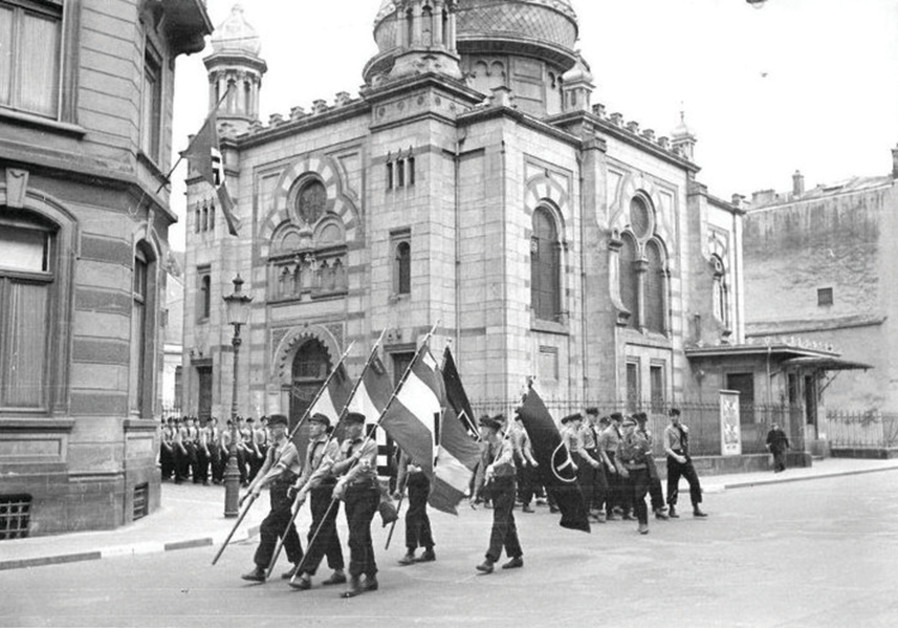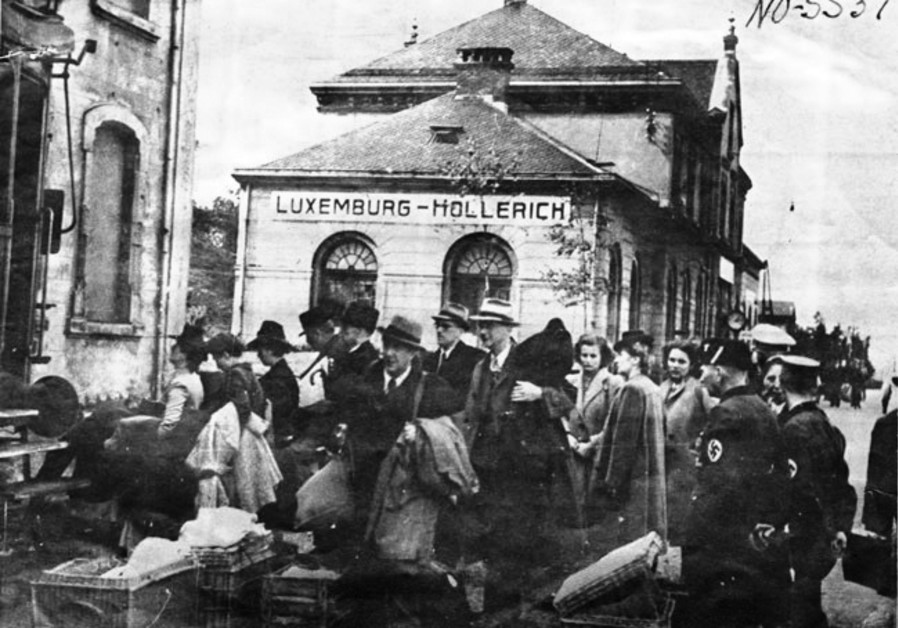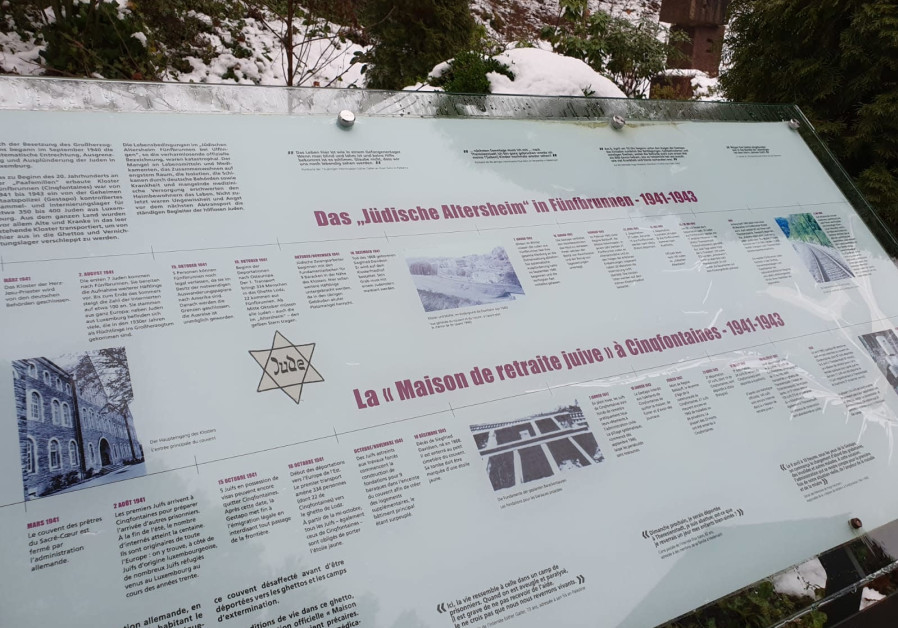The Cinqfontaines Abbey is a majestic gray monastery resting atop a snow-covered hill an hour-and-a-quarter drive from Luxembourg’s capital near the German border. During World War II, this pastoral site functioned as a stopover for Jews being transported to death camps. There were 3,900 Jews living in Luxembourg when the Germans invaded in August 1940. By the time emigration was banned in 1941, 2,500 of the country’s Jews had already managed to leave, most of them moving into France’s “Free Zone,” where hundreds of them were unfortunately handed over to the Nazis. Before that, in August 1941, the Nazis took over the Cinqfontaines Abbey, called it a “Jewish old age home,” and sent there all of the country’s elderly Jews who had not managed to escape. Over 400 people lived permanently at the old-age home, though the building was suitable for a maximum 100 people – in deplorable conditions and without even their most basic needs met, including heating and working toilets. Nazi policemen would arrive at the home occasionally and confiscate any personal items residents had brought with them, such as smuggled soaps. Although Jewish organizations had arranged for the residents to be given permits to move around the nearby area freely, none of the villagers were known to show any compassion to their desperate situation.  NAZIS MARCH past the synagogue in Luxembourg, 1941. It was destroyed in 1943. (JWH)The people currently living in the nearby village are still silent when asked what the monastery was used for during the war, despite the memorial plaque now erected at the site. The train tracks that lead directly up to the monastery that were used in the 1940s can still be seen there. Regularly stopping at the monastery, these trains were often filled to capacity with Jews being transported to the Theresienstadt, Sobibor and Auschwitz extermination camps. Historian Marc Schoentgen, who has done extensive research of the Cinqfontaines old-age home, claims that the transports to extermination camps were done quite discreetly and that residents who suffered from malnutrition had little strength to protest. Years-long negotiations held in an effort to turn the home into a memorial site finally came to an end recently, with the signing of a historic agreement to restore Jews’ property looted during the Holocaust. The agreement was signed by the Luxembourg government and the World Jewish Restitution Organization (WJRO), which initiated the negotiations. The restitution deal includes a one-time transfer of one million euro to Holocaust survivors and their families. In addition, according to the agreement, the Cinqfontaines site will be acquired by the government and turned into a memorial that will cost 25 million euro to construct.
NAZIS MARCH past the synagogue in Luxembourg, 1941. It was destroyed in 1943. (JWH)The people currently living in the nearby village are still silent when asked what the monastery was used for during the war, despite the memorial plaque now erected at the site. The train tracks that lead directly up to the monastery that were used in the 1940s can still be seen there. Regularly stopping at the monastery, these trains were often filled to capacity with Jews being transported to the Theresienstadt, Sobibor and Auschwitz extermination camps. Historian Marc Schoentgen, who has done extensive research of the Cinqfontaines old-age home, claims that the transports to extermination camps were done quite discreetly and that residents who suffered from malnutrition had little strength to protest. Years-long negotiations held in an effort to turn the home into a memorial site finally came to an end recently, with the signing of a historic agreement to restore Jews’ property looted during the Holocaust. The agreement was signed by the Luxembourg government and the World Jewish Restitution Organization (WJRO), which initiated the negotiations. The restitution deal includes a one-time transfer of one million euro to Holocaust survivors and their families. In addition, according to the agreement, the Cinqfontaines site will be acquired by the government and turned into a memorial that will cost 25 million euro to construct.
if(window.location.pathname.indexOf(“656089”) != -1){console.log(“hedva connatix”);document.getElementsByClassName(“divConnatix”)[0].style.display =”none”;}Additional funds will be spent on other memorials, archives, Holocaust study and commemoration grants. A joint government/WJRO committee will begin searching for the relatives of owners of abandoned foreign bank accounts, many of which were emptied in accordance with a 1975 law and insurance policies. “Apart from compensation to victims, the past and the future are inextricably linked,” says Gideon Taylor, WJRO chair of operations. “Understanding the past will help us to learn and to build a better world.”Marcel, a businessman whose parents were sent to the monastery during the Shoah, managed to escape, forced to hide with a peasant family in southern France. He never saw his parents again, but today is investing in Luxembourg. Marcel believes this agreement will restore to the Jews a sense of honor. Monastery abbot Claude Sibernaller, elderly and not in optimum health, receives us wearing a mask according to health restrictions. I see behind him a wall tapestry with the image of Jesus crucified on a baobab tree, surrounded by typical African landscape. Sibernaller knows that following the signing of the agreement, he and the other monks will be forced to leave the monastery. He claims it is good that a decision has finally been made. “No one here is ever in a hurry – especially not the government,” he says with a grin, showing us notebooks he unearthed containing accurate records of the distribution of equipment and work assignments, from when the building functioned as a so-called Jewish old-age home. DEPORTATION OF Jews from Hollerich, Luxembourg, by local police, 1942. (eurojewcong)THE TINY size of the country, its small population of about 600,000 and its location tucked between Belgium, France and Germany, made it a common meeting place for quarrelsome European kingdoms as they gathered to negotiate and sign agreements at the end of the 19th century. Moreover, it was the first capital of the soon-to-be-created European Union. The Schengen Agreement, which abolished border checks within Europe, was signed in Schengen, Luxembourg. Grand Duchess of Luxembourg Charlotte fled the country with her family and the Luxembourgish government after the Nazis overran the country, which led to the creation of a myth that the country was controlled by the Nazis without any collaboration with local government. However, a report submitted to Prime Minister Xavier Bettel in 2011 highlights the great amount of responsibility the local Luxembourg government had in persecuting Jews. This later led the prime minister to apologize to the local Jewish community, which currently numbers 1,600 people. “We recently purchased Cinqfontaines, which was a place of great suffering for the Jewish people,” affirmed Bettel, who has been premier for seven years, standing in his office in the city center before leaving for the agreement-signing ceremony. “We will invest the required monies for the memorial fund. In order to strengthen our words of apology to the Jewish people that were uttered a few years ago, we must fight antisemitism, engage in research at the university and acknowledge the suffering of the Jews, for which they were never compensated. Now that we’ve apologized for our moral shortcomings, it is time to offer material compensation.”It’s taken you quite a long time to acknowledge Luxembourg’s responsibility.
DEPORTATION OF Jews from Hollerich, Luxembourg, by local police, 1942. (eurojewcong)THE TINY size of the country, its small population of about 600,000 and its location tucked between Belgium, France and Germany, made it a common meeting place for quarrelsome European kingdoms as they gathered to negotiate and sign agreements at the end of the 19th century. Moreover, it was the first capital of the soon-to-be-created European Union. The Schengen Agreement, which abolished border checks within Europe, was signed in Schengen, Luxembourg. Grand Duchess of Luxembourg Charlotte fled the country with her family and the Luxembourgish government after the Nazis overran the country, which led to the creation of a myth that the country was controlled by the Nazis without any collaboration with local government. However, a report submitted to Prime Minister Xavier Bettel in 2011 highlights the great amount of responsibility the local Luxembourg government had in persecuting Jews. This later led the prime minister to apologize to the local Jewish community, which currently numbers 1,600 people. “We recently purchased Cinqfontaines, which was a place of great suffering for the Jewish people,” affirmed Bettel, who has been premier for seven years, standing in his office in the city center before leaving for the agreement-signing ceremony. “We will invest the required monies for the memorial fund. In order to strengthen our words of apology to the Jewish people that were uttered a few years ago, we must fight antisemitism, engage in research at the university and acknowledge the suffering of the Jews, for which they were never compensated. Now that we’ve apologized for our moral shortcomings, it is time to offer material compensation.”It’s taken you quite a long time to acknowledge Luxembourg’s responsibility.
“As prime minister I am responsible for what our country has done in the past as well, and I do not know why previous governments were not successful. Maybe they hadn’t done enough research. and I am proud that the government has now done the right thing. The Jewish community and Holocaust survivors here in Luxembourg appreciate the work we are doing now to memorialize the Jews who lost their lives and to counter antisemitism.”According to Bettel, the battle for tolerance is in his DNA.“I am a special case, since I’m one-fourth Jewish. My Jewish grandfather, Maurice Shapiro, was born in Warsaw. I also had a Russian Orthodox grandmother, an atheist Luxembourgish grandfather and a French Catholic grandmother. My Jewish grandfather died at a very young age in France, and I never had a chance to meet him. I grew up honoring the traditions of all religions. As a child, I loved that we celebrated so many different holidays with our various relatives. This is how I learned the values of openness, tolerance and understanding. “It’s important to me that all of the religious communities in Luxembourg be allowed to engage in religious ritual freely and that they be given the resources to do so. Having the freedom to live your life as you choose and to be different is of immense importance. We hold dialogues with the representatives of all religions so we can better live together in the same community.”Luxembourgers were not renowned for giving any assistance to Jews during World War II.
“It’s my duty as prime minister to ensure that we don’t go to places the Nazis did during the Second World War. We cannot erase the past. We need to be able to talk, learn and investigate. A few years ago, I apologized in front of a Jewish audience. I said that not all of us were heroes, and the people here were shocked that I said that. “There were Luxembourgers who saved Jews – one of our government ministers was even recognized as a Righteous Among the Nations by Yad Vashem [Victor Bodson, Luxembourg minister of justice, recognized in 1966 for saving 100 Jews by housing them at his home on the Germany-Luxembourg border]. We shouldn’t believe that everyone was indifferent. Not all of the people who lent a hand were recognized – some of them have never been discovered. Fear and egocentrism led people to act in ways that did not lead to solidarity.” A LUXEMBOURG City monument to the country’s Jews killed in the Holocaust, created by Polish artist Selomo Seliger. (Gideon Kotz)Luxembourg-style secularism was intended to ensure inclusion of all citizens, but are you intending to use it as a tool against religious extremism and racism as has been done in France?
A LUXEMBOURG City monument to the country’s Jews killed in the Holocaust, created by Polish artist Selomo Seliger. (Gideon Kotz)Luxembourg-style secularism was intended to ensure inclusion of all citizens, but are you intending to use it as a tool against religious extremism and racism as has been done in France?
“You cannot fight against racism with secularism. Secularism is not anti-religion. Religion creates communities that need to live side by side. In the past, we were a Catholic country, but today we are a secular one. This was not done, however, in an effort to fight against antisemitism. “It’s incorrect to say that Luxembourg is protected from antisemitism and racism. Nowadays, antisemitism is a reality, just as racism and homophobia are, and too often people tend to remain silent in the face of these phenomena. We must condemn them in our private lives as well, and not just in public statements… We are incredibly lucky that here in Luxembourg there is no radical right-wing political party as there are in other European states. But have we truly learned from our history? I think about this on a daily basis.”ANOTHER ONE of the many manifestations of intolerance Bettel is fighting is homophobia. Bettel is openly gay and often brings his husband to official government events. In July 2019, Bettel made headlines in Israel after he canceled his participation in the official final banquet with outgoing Israeli ambassador Simona Frankel after then-education minister Rafi Peretz made his infamous comment about conversion therapy for homosexuals. “Statements like these are simply unacceptable,” Bettel explains. “To go to a meal and sit at a table and remain silent after someone has claimed homosexuality is a sickness that needs to be cured – I simply cannot do that. And this said by a government minister no less. I say no to hate talk. The ambassador was not to blame, and she was actually quite sympathetic about the whole thing, but the dinner took place just after this incident and no apology was made. Relations with the current ambassador are excellent. I am a person who is extremely interested in dialogue, and if Mr. Netanyahu, whom I know well, were to call me tomorrow, I would answer immediately.”But Prime Minster Benjamin Netanyahu did not make that call; former US secretary of state Mike Pompeo also experienced firsthand anger from Luxembourg. The signing ceremony of the agreement for the return of Jewish property was scheduled to take place with the participation of Pompeo, but then the riots in the US Capitol broke out.“We could not hold this ceremony while people wearing shirts with the inscription ‘Auschwitz’ on them were storming the US Capitol. This was absolutely scandalous, and so I postponed the ceremony. There was no way I could engage in memorializing the lives of people who’d died in the Holocaust when people were engaging in this type of behavior. I could not welcome secretary Pompeo even if it caused problems. I could not sign an agreement in the presence of someone who had not condemned these actions. These events brought back many difficult memories.”In spite of everything, Bettel – a sworn European – is aware that in today’s historical and political reality, Europe has no right to preach morality to the rest of the world. “We cannot teach the entire world a lesson,” he says with a sigh. “Europe cannot be the judge of all the countries around the world, even though sometimes we create the impression that we are. We must be able to condemn countries that are not acting as we think they should be, as we do Israel vis-à-vis the Palestinians, but we should not force our opinions on others.” Translated by Hannah Hochner.
Source
 RSS Feed
RSS Feed















 March 11th, 2021
March 11th, 2021  Awake Goy
Awake Goy  Posted in
Posted in  Tags:
Tags: 













